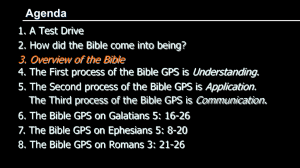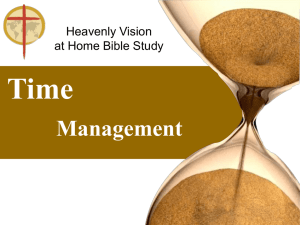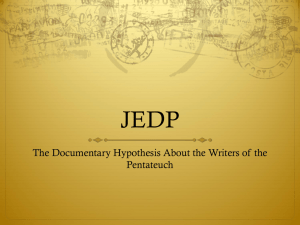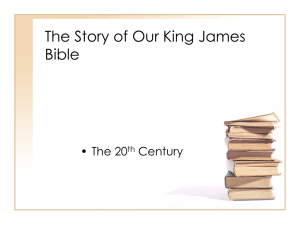AD 500
advertisement
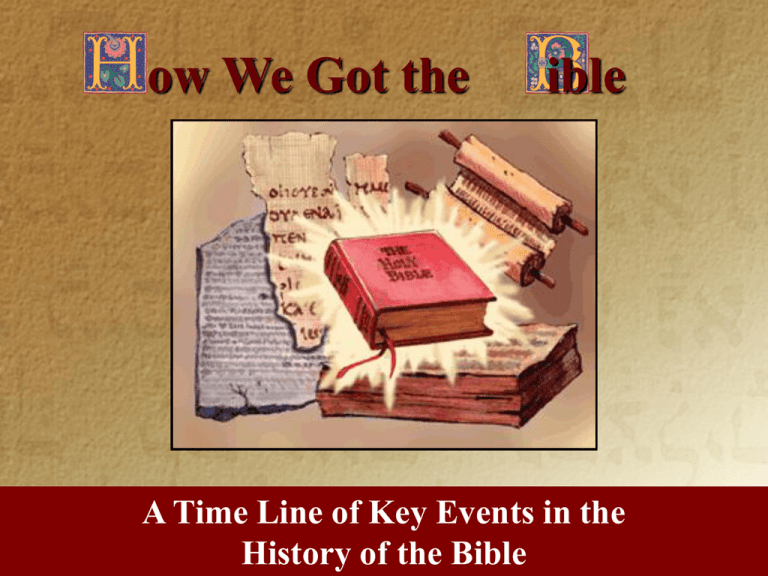
ow We Got the ible A Time Line of Key Events in the History of the Bible AD 500 Roman Empire Declines Germanic migrations (AD 378-600) cause new languages, other than Latin, to emerge. 1500 BC BC 1500 500 500 BC BC AD AD11 AD AD 500 500 AD AD1000 1000 Germanic Peoples AD AD1500 1500 AD AD1900 1900 AD 2000 AD 2000 AD 596 The Bible in Britain BRITAIN Canterbury 1500 BC 1500 BC 500 500 BC BC AD AD11 AD AD 500 500 • AD AD1000 1000 In AD 596, Augustine of Canterbury begins evangelization. AD AD1500 1500 AD AD1900 1900 AD 2000 AD 2000 AD 600 The Bible in Britain Christianity reaches Britain (England) before AD 300, but Anglo-Saxon pagans drive Christian Britons into Wales (AD 450-600). Britain 1500 BC 1500 BC 500 500 BC BC AD AD11 AD AD 500 500 AD AD1000 1000 AD AD1500 1500 AD AD1900 1900 AD 2000 AD 2000 AD 600-700 The Bible in Britain Caedmon, an illiterate monk, retells portions of Scripture in Anglo-Saxon (Old English) poetry and song (AD 676). Aldhelm of Sherborne (AD 709) is said to have translated the Psalms into Anglo-Saxon. 1500 BC 1500 BC 500 500 BC BC AD AD11 AD AD 500 500 AD AD1000 1000 AD AD1500 1500 AD AD1900 1900 AD 2000 AD 2000 AD 600-700 The Bible in Britain Bede, a monk and scholar, makes an Old English (Anglo-Saxon) translation of portions of Scripture. On his deathbed in AD 735, he finishes translating the Book of John. 1500 BC 1500 BC 500 500 BC BC AD AD11 AD AD 500 500 AD AD1000 1000 AD AD1500 1500 AD AD1900 1900 AD 2000 AD 2000 AD 800-900 The Bible in Britain Alfred The Great, King of Wessex (AD 871-901) translates portions of Exodus, Psalms, and Acts into Anglo-Saxon. 1500 BC 1500 BC 500 500 BC BC AD AD11 AD AD 500 500 AD AD1000 1000 AD AD1500 1500 AD AD1900 1900 AD 2000 AD 2000 AD 950 The Bible in Britain Aldred, Bishop of Durham, inserts a translation in the Northumbrian dialect between the lines of the Latin text of the Lindisfarne Gospels (AD 950). The Lindisfarne Gospels is a document found on an island off the coast of Northumberland (Northern England). 1500 BC 1500 BC 500 500 BC BC AD AD11 AD AD 500 500 AD AD1000 1000 AD AD1500 1500 Lindisfarne Gospels AD AD1900 1900 AD 2000 AD 2000 AD 955-1020 The Bible in Britain Aelfric (AD 955-1020) translates portions of the Latin Old Testament into Anglo-Saxon. 1500 BC 1500 BC 500 500 BC BC AD AD11 AD AD 500 500 AD AD1000 1000 A Portion of Psalm 50 in AngloSaxon AD AD1500 1500 AD AD1900 1900 AD 2000 AD 2000 AD 1300 The Bible in Britain Normans (French) conquer England (AD 1066) and make French the official language. No English translation of the Bible is produced until the 1300s. 1500 BC 1500 BC 500 500 BC BC AD AD11 AD AD 500 500 AD AD1000 1000 AD AD1500 1500 AD AD1900 1900 AD 2000 AD 2000 AD 1300 The Bible in Britain Middle English emerges, popularized by works such as Geoffrey Chaucer's Canterbury Tales and Richard Rolle’s Psalter (AD 1340). 1500 BC 1500 BC 500 500 BC BC AD AD11 AD AD 500 500 AD AD1000 1000 Geoffrey Chaucer AD AD1500 1500 AD AD1900 1900 AD 2000 AD 2000 AD 1300 The Bible in Britain Before the printing press is invented, the Bible is copied by hand very accurately. In many cases it is copied by special scribes who develop intricate methods of counting words and letters to insure that no errors are made. 1500 BC 1500 BC 500 500 BC BC AD AD11 AD AD 500 500 AD AD1000 1000 AD AD1500 1500 AD AD1900 1900 AD 2000 AD 2000 AD 1300 The Wycliffe Bible The first English Bible is translated from Latin in AD 1382. It is called the Wycliffe Bible in honor of priest and Oxford scholar John Wycliffe. Page from Wycliffe Bible 1500 BC 1500 BC 500 500 BC BC AD AD11 AD AD 500 500 AD AD1000 1000 AD AD1500 1500 AD AD1900 1900 AD 2000 AD 2000 AD 1300 The Wycliffe Bible During his lifetime, Wycliffe had wanted common people to have the Bible. He also criticized a number of church practices and policies. John Wycliffe 1500 BC 1500 BC 500 500 BC BC AD AD11 AD AD 500 500 AD AD1000 1000 AD AD1500 1500 AD AD1900 1900 AD 2000 AD 2000 AD 1408 The Wycliffe Bible In AD 1408, in England, it becomes illegal to translate or read the Bible in common English without permission from a bishop. 1500 1500BC BC 500 500BC BC AD AD11 AD AD500 500 ADAD 1000 1500 1000 ADAD 1500 ADAD 1900 1900 AD AD2000 2000 AD 1428 The Wycliffe Bible In AD 1415, the Wycliffe Bible is banned and burned. Forty years after Wycliffe’s death, in AD 1428, his bones are exhumed and burned for heresy. 1500 BC 1500BC BC 1500 500 500BC BC 500 BC AD AD111 AD AD AD500 500 AD 500 AD 1000 1500 AD 1000 AD AD 1500 AD 1000 AD 1500 AD 1900 AD 1900 AD 1900 AD 2000 AD2000 2000 AD AD 1516 Erasmus Erasmus, a priest and Greek scholar, publishes a new Greek edition and a more accurate Latin translation of the New Testament in AD 1516. Erasmus 1500 1500BC BC 500 500BC BC AD AD11 AD AD500 500 ADAD 1000 1500 1000 ADAD 1500 ADAD 1900 1900 AD AD2000 2000 AD 1516 Erasmus Erasmus’s goal was that everyone be able to read the Bible, “from the farmer in the field to the weaver at the loom.” His Greek text forms the basis of the Textus Receptus or received text. The Textus Receptus is used later by Martin Luther, William Tyndale, and the King James translators. 1500 1500BC BC 500 500BC BC AD AD11 AD AD500 500 ADAD 1000 1500 1000 ADAD 1500 ADAD 1900 1900 AD AD2000 2000 AD 1522 Martin Luther Martin Luther translates the New Testament into German in AD 1522. Martin Luther 1500 1500BC BC 500 500BC BC AD AD11 AD AD500 500 ADAD 1000 1500 1000 ADAD 1500 ADAD 1900 1900 AD AD2000 2000 Martin Luther • Martin Luther had a small head-start on Tyndale, as Luther declared his intolerance for the Roman Church’s corruption on Halloween in 1517, by nailing his 95 Theses of Contention to the Wittenberg Church door. • Luther, who would be exiled in the months following the Diet of Worms Council in 1521 translated the New Testament into German for the first time from the 1516 Greek-Latin New Testament of Erasmus, and published it in September of 1522. • Luther also published a German Pentateuch in 1523, and another edition of the German New Testament in 1529. In the 1530’s he would go on to publish the entire Bible in German. AD 1525 William Tyndale William Tyndale, priest and Oxford scholar, translates the New Testament from Greek into English (AD 1525), but cannot get approval to publish it in England. 1500 1500BC BC 500 500BC BC AD AD11 AD AD500 500 ADAD 1000 1500 1000 ADAD 1500 William Tyndale ADAD 1900 1900 AD AD2000 2000 AD 1536 William Tyndale In AD 1536, Tyndale is strangled and burned at the stake. His final words are: “Lord, open the King of England’s eyes.” Tyndale is called the “Father of the English Bible” because his translation forms the basis of the King James Version. Much of the style and vocabulary we know as “biblical English” is traceable to his work. 1500 1500BC BC 500 500BC BC AD AD11 AD AD500 500 ADAD 1000 1500 1000 ADAD 1500 ADAD 1900 1900 AD AD2000 2000 AD 1536 William Tyndale 1530, he wrote The Practyse of Prelates, opposing Henry VIII's divorce on the grounds that it was unscriptural and was a plot by Cardinal Wolsey to get Henry entangled in the papal courts. 1500 1500BC BC 500 500BC BC AD AD11 AD AD500 500 ADAD 1000 1500 1000 ADAD 1500 ADAD 1900 1900 AD AD2000 2000 AD 1539 The Great Bible In AD 1539, the Great Bible is placed in every church by order of Thomas Cranmer, archbishop under King Henry VIII. It is read aloud except during services and sermons. Page from the Great Bible 1500 1500 BC BC 500 500BC BC AD AD11 ADAD500 500 ADAD 1000 1000 ADAD 1500 1500 AD AD 1900 1900 AD AD2000 2000 AD 1555 Queen Mary England’s Queen Mary bans Protestant translations of the English Bible. John Rogers and Thomas Cranmer are burned at the stake. Later some 300 men, women, and children are also burned. 1500 1500 BC BC 500 500BC BC AD AD11 ADAD500 500 ADAD 1000 1000 ADAD 1500 1500 Queen Mary AD AD 1900 1900 AD AD2000 2000 AD 1560 The Geneva Bible Exiles from England flee to Geneva, Switzerland. In AD 1560, they print the Geneva Bible, which is a complete revision of the Great Bible with the Old Testament translated from Hebrew. Page from Geneva Bible 1500 1500 BC BC 500 500BC BC AD AD11 ADAD500 500 ADAD 1000 1000 ADAD 1500 1500 AD AD 1900 1900 AD AD2000 2000 AD 1539 The Great Bible In AD 1539, the Great Bible is placed in every church by order of Thomas Cranmer, archbishop under King Henry VIII. It is read aloud except during services and sermons. Page from the Great Bible 1500 1500 BC BC 500 500BC BC AD AD11 ADAD500 500 ADAD 1000 1000 ADAD 1500 1500 AD AD 1900 1900 AD AD2000 2000 AD 1560 The Geneva Bible Exiles from England flee to Geneva, Switzerland. In AD 1560, they print the Geneva Bible, which is a complete revision of the Great Bible with the Old Testament translated from Hebrew. Page from Geneva Bible 1500 1500 BC BC 500 500BC BC AD AD11 ADAD500 500 ADAD 1000 1000 ADAD 1500 1500 AD AD 1900 1900 AD AD2000 2000 AD 1560 The Geneva Bible The Geneva Bible contains theological notes from Protestant scholars John Calvin, Beza, Knox, and Whittingham. It is the first Bible to use Roman type. John Calvin 1500 1500 BC BC 500 500BC BC AD AD11 ADAD500 500 ADAD 1000 1000 ADAD 1500 1500 AD AD 1900 1900 AD AD2000 2000 AD 1611 King James Version King James I commissions 54 scholars to undertake a new Bible translation. For six years, six teams of scholars using the Textus Receptus, Bishops Bible, and Tyndale’s Bible, complete the new version in AD 1611. King James I of England 1500 1500 BC BC 500 500BC BC AD AD11 ADAD500 500 ADAD 1000 1000 ADAD 1500 1500 AD AD 1900 1900 AD AD2000 2000 King James Version's dependence on the Textus Receptus • It is now widely accepted by textual scholars that the selection of manuscripts available to Erasmus was quite limited — due partly to his time constraints, partly to geographic isolation before high-speed transit, and partly to the fact that many important texts were as yet undiscovered — being confined to a few late medieval texts that most modern scholars consider to be of dubious quality.[ Last Stop - Translations


